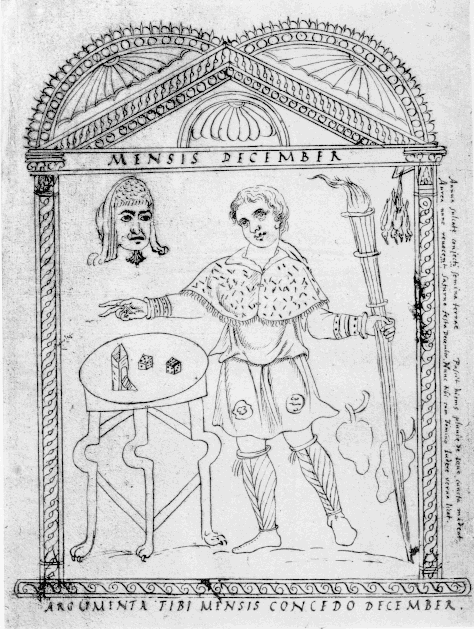kwaw
Argumenta tibi mensis concedo December.
The verses and illustrations of the months are generally inspired by their festivals [here Saturnalia], their labours (here in text in side margin to sowing seeds, hunting), weather (here rain), and position (close of the year).
Quote:
DECEMBER
"Annua sulcatae conectens semina terrae Pascit hiems: Pluvio de Iove cuncta madent. Aurea nunc revocet Saturno festa December: Nunc tibi cum domino ludere, verna, licet.
"Winter, collecting in the furrows of earth the seeds of the annual sowing, makes it fertile. Everything drips with rain. Now December may dedicate again its merry feasts to Saturn (i.e. may again celebrate the Saturnalia): now, 0 slave, it is granted you to play with your master.
"Arguments tuis festis concedo, December, guale sis quamvis annum claudere possis (?).
"I leave to your festivals, 0 December, to describe you, although such as you are, you bring the year to a close ( ?).
“… the main scene in the Calendar of Filocalus, leaving aside all naturalistic elements, draws its inspiration only from the feast of Saturnalia: here is the slave, but wearing the winter garments of the shepherd or rather of the hunter, skin-boots and a short skincloak around his breast; he holds a torch and plays dice, which are visible on a little table near their characteristic tumbler, called pyrgos. Another hint at the festival is a mask high up in the field on the left. The leaf-shaped objects below on the right are difficult to interpret; on the corner above is hanging the bundle of thrushes which we have seen in the hunter's hand in the Carthage mosaic, and which brings us back to the hunting activity pursued in this month.”
End quote from:
“THE ALLEGORIES OF THE MONTHS IN CLASSICAL ART by Doro Levi in The Art Bulletin Vol. 23, No. 4 (Dec., 1941), pp. 251-291
Kwaw
kwaw said:December from the calendar in Chronography of 354

The verses and illustrations of the months are generally inspired by their festivals [here Saturnalia], their labours (here in text in side margin to sowing seeds, hunting), weather (here rain), and position (close of the year).
Quote:
DECEMBER
"Annua sulcatae conectens semina terrae Pascit hiems: Pluvio de Iove cuncta madent. Aurea nunc revocet Saturno festa December: Nunc tibi cum domino ludere, verna, licet.
"Winter, collecting in the furrows of earth the seeds of the annual sowing, makes it fertile. Everything drips with rain. Now December may dedicate again its merry feasts to Saturn (i.e. may again celebrate the Saturnalia): now, 0 slave, it is granted you to play with your master.
"Arguments tuis festis concedo, December, guale sis quamvis annum claudere possis (?).
"I leave to your festivals, 0 December, to describe you, although such as you are, you bring the year to a close ( ?).
“… the main scene in the Calendar of Filocalus, leaving aside all naturalistic elements, draws its inspiration only from the feast of Saturnalia: here is the slave, but wearing the winter garments of the shepherd or rather of the hunter, skin-boots and a short skincloak around his breast; he holds a torch and plays dice, which are visible on a little table near their characteristic tumbler, called pyrgos. Another hint at the festival is a mask high up in the field on the left. The leaf-shaped objects below on the right are difficult to interpret; on the corner above is hanging the bundle of thrushes which we have seen in the hunter's hand in the Carthage mosaic, and which brings us back to the hunting activity pursued in this month.”
End quote from:
“THE ALLEGORIES OF THE MONTHS IN CLASSICAL ART by Doro Levi in The Art Bulletin Vol. 23, No. 4 (Dec., 1941), pp. 251-291
Kwaw

